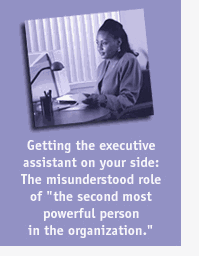
Your Most Valuable Ally
| Продажи | ||||
| Sales.com | ||||
| Getting.... | ||||
by Graham Denton
For many salespeople, the most forbidding of all gatekeepers is the top manager's administrative assistant or executive secretary. Tony Parinello, in his book Selling to VITO, points out that this phobic reaction usually is based on a misunderstanding of this person's actual role in the organization.
 Rather
than seeing the top executive's assistant as a functionary, competent
professionals understand that this person is "the second most powerful
person in the organization." They credit him or her with being on top
not just of airline bookings and lunch dates but of the "goals, obstacles,
and predispositions" of the Very Important Top Officers (VITOs) they work
for, and therefore of the organization at large. They treat him or her,
therefore, with the same respect that they would extend to the person's
boss. "This is a person you want -- and must treat -- as a valuable ally."
Here are two guidelines for moving toward this nontraditional but invaluable
understanding.
Rather
than seeing the top executive's assistant as a functionary, competent
professionals understand that this person is "the second most powerful
person in the organization." They credit him or her with being on top
not just of airline bookings and lunch dates but of the "goals, obstacles,
and predispositions" of the Very Important Top Officers (VITOs) they work
for, and therefore of the organization at large. They treat him or her,
therefore, with the same respect that they would extend to the person's
boss. "This is a person you want -- and must treat -- as a valuable ally."
Here are two guidelines for moving toward this nontraditional but invaluable
understanding.
First, learn the assistant's name before contacting the executive, and use it in the initial communication used for setting up an appointment.
You know the "action P.S." that salespeople often tack on to the end of query letters: "I'll call your assistant at 2 PM on Friday the 12th to see when we can get together." Parinello advises this small but important change: "I'll call your office at 2 PM on Friday the 12th. If this is not convenient for you, will you please have Stacey tell me a better time to call?" This establishes a connection with Stacey even before you meet her -- and used in this way, it usually means that your letter actually will get passed on to the boss.
Second, make the assumption that the administrator knows just as much about the business as the executive -- and write and speak to him or her accordingly. In fact, Parinello says, you should "talk to and treat this person as a VITO." And mean it.
This doesn't mean that VITO's assistant has exactly the same vision or level of responsibility as the executive. It means only that she has the ability to speak for the executive, and will do so competently if you encourage her. Since most salespeople don't encourage her, the rare salesperson who does gains an immediate advantage. Parinello puts it nicely. Every day, he says, assistants to top decision makers "are forced to deal with people who don't acknowledge the pivotal role they play in attaining company goals. Your tactic is to not be like those people."
That's real differentiation, and it's worth its weight in gold. Just be sure that, if you take this advice, you do it because you accept the underlying principle of equality. If there's anything more irritating to a competent assistant than outright condescension, it's a patronizing attitude. "If you have the slightest doubt about your ability to deal with the personal assistant as a business equal," don't fake it. Seeing through such game playing is part of these professionals' stock in trade.